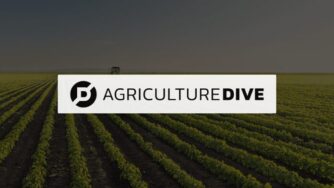Read the Full Article “Profile of a Founder: Bruno Basso, Ph.D. of CIBO Technologies”
An exclusive Tech Tribune Q&A with Bruno Basso (co-founder and Chief Scientist) of CIBO Technologies, which was honored in our:
Tell us the origin story of CIBO Technologies – what problem were you trying to solve and why?
CIBO was founded by Flagship Pioneering in 2015, with the big idea of applying advanced science and technology to generate a deep understanding of land and agricultural systems at scale, and without requiring local data or boots-in-the-dirt. Today, CIBO Technologies has developed the most advanced technology platform that helps enterprises scale their agricultural regeneration and carbon programs to meet their carbon and climate commitments.
We do this by defining, developing, and delivering a complete and scaled solution including technology, programs, and breakthrough carbon and food system security insights. These include carbon intensity of crop yields, carbon footprint of farming practices on each field, farm and supply shed, as well as the Regenerative Potential (™) of any plot of farmland in the US.
We deliver these insights and programs through a first of its kind scaled platform architecture that brings together technology and data from soil to space. This includes AI-based, satellite computer vision, ecosystem modeling, practice inference, detailed greenhouse gas emissions, and carbon sequestration quantification.
Armed with such information and with the help of our experts, enterprises are able to craft programs that incentivize, engage, and enroll growers while verifying practices and carbon sequestration. Combining platform technology to forecast, model, monitor, verify and report (MVR) regenerative farming practices at scale, CIBO delivers unprecedented visibility into carbon intensity, carbon footprint and regenerative potential of land across entire supply sheds, portfolios, and supply chains.
CIBO combines our insight capabilities with program and grower engagement solutions that connect farmers with incentive programs offered by businesses. CIBO delivers programs that create a deep understanding of sustainable farming systems that help mitigate climate change, advance food system resilience, and improve grower outcomes.
What was the biggest hurdle you encountered in your journey?
From the start, we knew that the science behind nature-based regeneration and climate solutions was strong. It had been tested and retested in universities, laboratories, data centers and test-fields around the world, but no one was able to successfully scale the science to deliver confident results that would make for a successful commercial application.
Through openness and collaborative communication with our customers, prospects, investors and scientists, we were able to overcome the huge hurdles of scale. By bringing together the world’s leading scientists to invent award winning scalable ecosystem engines, program delivery processes, and carbon quantification reporting with the best computer science, product development engineers, and sales and marketing teams, we are able to deliver the CIBO Impact platform with ground breaking experiences for enterprises, growers, and anyone with “ag” in their supply chain.
We had many iterations before we got it right, and we expect we will have many more as we continue to learn and grow with our customers and partners. Overcoming the scalability challenge at the outset was key. We are excited to see what we achieve from here.
What does the future hold for CIBO Technologies?
CIBO is powering ahead with many more innovations and additions to our platform. CIBO is expanding scaled technology capabilities, adding crops, adding geographies, and continuing to improve our ability to detect, verify, monitor, quantify, and report on GHG emissions decreases and carbon sequestration. CIBO has submitted the first U.S. agriculture carbon sequestration project to Verra – the top carbon credit verification and protocol control body in the world. This is a huge milestone and the first of many. Included with this project submission is a detailed and robust model verification that confirms CIBO’s modeling and computer vision capabilities are better at quantifying and verifying carbon sequestration from regenerative and sustainable farming practices than even boots-on-the-ground soil sampling.
Soon, CIBO will roll out CIBO Supply Shed, an advanced Supply Shed Analysis that provides visibility for enterprises to understand the carbon footprint, carbon intensity, and rate of regenerative practice adoption in a defined geographic area. Supply Shed Analysis allows companies to analyze a state, county, watershed or user-defined geographic area to determine its carbon footprint, carbon intensity, and the rate of adoption of practices including cash crop, cover crop, and tillage. CIBO Supply Shed also enables enterprises to perform what-if analysis on the impact of new practice adoption. After incentive programs are implemented, companies can quantify their progress towards carbon reduction and regenerative adoption targets.



